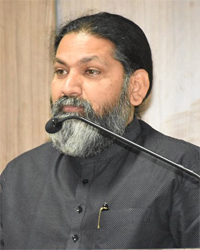
Contact me
Prof. Munish Sharma
Director General, MITProf. Munish Sharma's dynamic presence is the single biggest asset of the MIT Group of Institutions. Prof. Munish Sharma is the Director General of MIT Group. He spearheads MIT with a vision to impart enterprising flavor to its teaching and research involving the students, staff and the alumni.
More specifically, Prof. Sharma oversees strategies and initiatives to promote industry and academia collaboration. Prior to becoming the Director General in 2008, Prof. Sharma held the position of Director (Planning) at MIT, with a focus on expanding the organic growth of MIT in India. He was responsible for planning, designing, erecting & commissioning technical institutions of G.S. Mandal in Aurangabad, Delhi and Bulandshahar. Prof. Sharma had obtained his degree in Civil Engineering at the Dr. Babasaheb Ambedkar Marathwada University, Aurangabad. He completed his Masters (Valuation specialization) in Plant & Machinery from the Sardar Patel University, Vallabh Vidya Nagar, Anand, Gujarat. Prior to taking charge at MIT, Prof. Sharma had worked as a professional consultant in the field of valuation. He was an expert appraiser of plant & machinery and carried out several valuation assignments in different fields for public sector, the corporate sector, as well as, the private sector.
Director General's Message
I am pleased to inform you that, in our various institutions and fully equipped campuses, we offer more than 53 courses at undergraduate and graduate level in diverse disciplines like; Agriculture, Engineering, Technology, Management, Information Technology, Architecture, Food Processing Technology, Applied Science, Health Sciences and Nursing. Our VISION and MISSION has been, and will continue to be, a guiding force for me and my colleagues. MIT is a place where we, not only, strive to train the students to acquire practical and professional knowledge, but also, help them to become excellent technocrats, thinkers and leaders. We make sure, that the students imbibe social responsibilities and ethical principles, and go on to strongly and safely create improvements in the lives of people. An MIT group of institutions is one of the best places to seek technical & professional excellence in education.
The programmes that we offer in various institutions of MIT enjoy the highest standards and lead to meaningful careers. Our qualified, experienced and dedicated faculty is striving and will continue to strive for educational enrichment of our students. Our staff constantly engages in research and development activities and participates in various national and international level symposiums to update its knowledge base with the latest international technological advancements. Over the years, we have transformed MIT, from a mere teaching institution, to one of the best institutions of learning and development. Innovation is, and will continue to be, the keyword at MIT. Our initiatives in industry tie-ups for technological upgrades, along with international partnerships and projects, go a long way to achieve our primary objective; which is, to provide top-of-the-line engineering education in our campuses.
A 'Center for Innovation' has been created to nurture talents with an entrepreneurial and global mindset. This centre comprises of a 'Center of Excellence' (COE) instituted in different fields of engineering & technology and an 'Industry-Institute Interaction Cell', which works in association with twenty knowledge partners from the corporate sector and more than 250 industry associates. Corporate members have also signed a memorandum of understanding (MoU) with MIT, for imparting knowledge about the latest trends in technical & professional education through the concept of 'Finishing School'. Similarly, environment oriented initiatives have propelled us to run many projects related to energy conservation, solar power, bio-fuels, bio-gassifiers and many more. By serving as a catalyst for industry-academic partnerships, MIT attempts to bring intellectual capital and emerging technologies together to improve quality of engineering and technology education. Ultimately, this contributes towards building India's capacity for intellectual and economic growth, catering to the need of the stakeholders.